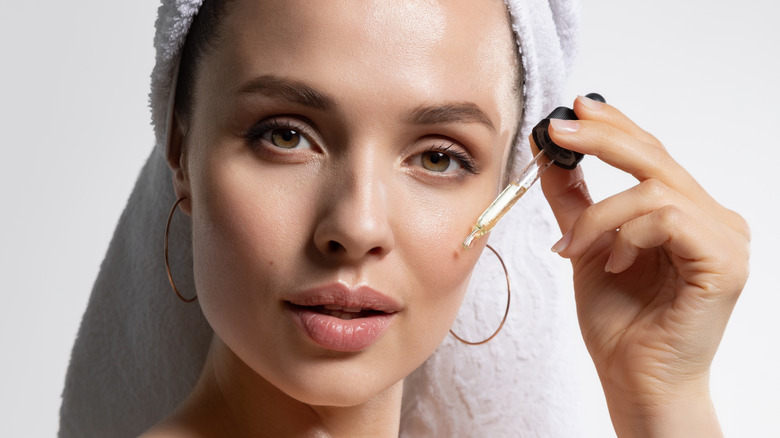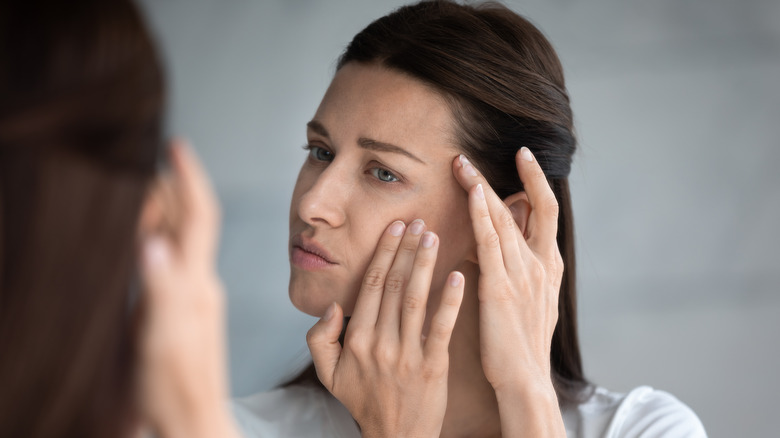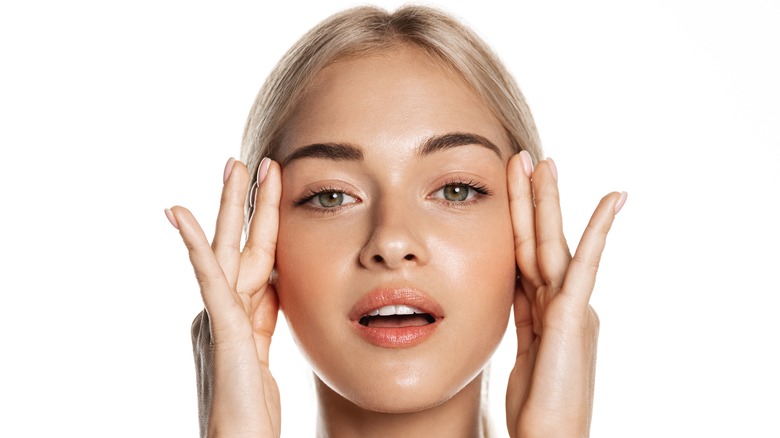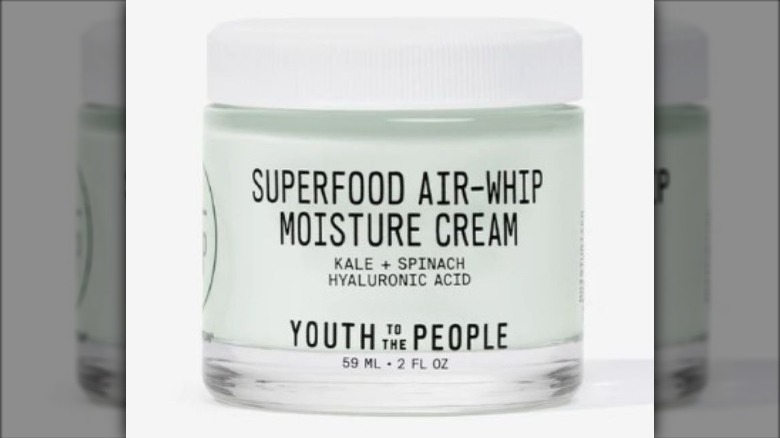How Much Hyaluronic Acid Should You Really Be Using?
We may receive a commission on purchases made from links.
Hyaluronic acid is one of the most buzzworthy phrases in the skincare world right now. If you have dry skin, you have probably read that this is the magical ingredient your thirsty skin needs. Dermatologist Claire Wolinsky told Byrdie, "When a hyaluronic acid-based lotion or serum is applied to the skin, it can attract and hold water, leading to a plumping and hydrating effect." Hyaluronic acid is a humectant naturally present in our skin and holds almost "1,000 times its weight in water."
As we age, we lose the amount of hyaluronic acid in our body, and that is when you can turn to hyaluronic acid serums and moisturizers to add them topically to our skin. Everyday Health shared that when your skin doesn't have enough moisture, it can look "dry, rough, and flaky." New York City-based dermatologist Shari Marchbein told the outlet, "Poorly hydrated skin is unable to maintain an appropriately intact skin barrier, leaving the skin more vulnerable to damage from external and environmental sources," which can lead to infections and skin conditions like eczema.
Hyaluronic acid has more than just skin benefits. According to Healthline, hyaluronic acid can help decrease joint pain, reduce wound healing time, and lessen dry eye issues because it is also present in our connective tissues and eyes. However, too much of a good thing can be harmful. In this case, the amount of hyaluronic acid and what weather you use it in could cause more harm than good.
Too much hyaluronic acid can cause dehydration and other skin issues
Humectants like hyaluronic acid are great for attracting water to the skin and relieving dehydration, but they might backfire if you use them in dry climates. While you apply hyaluronic acid with good intentions, if you are in a dry environment or spending a lot of time indoors with the heat blasting, the dry air can suck the moisture out of your skin, making your dry skin more dehydrated. Beverly Hills-based dermatologist Ava Shamban told Refinery29, "If your skin is dehydrated, to begin with, and the air around you is dry, then the product can actually suck water from deeper in the skin." (Yikes!)
Most people's skin won't react negatively to hyaluronic acid, but using too much hyaluronic acid with low-molecular-weight could cause inflammation, per Byrdie. Those with oily or acne-prone skin need to practice caution as too much serum may cause a "shiny, greasy complexion or clogged pores." Brooklyn, New York-based dermatologist Nava Greenfield told the outlet, "You should still moisturize, but don't go overboard!" Everything in moderation.
How to use hyaluronic acid and how much
Now that you know the benefits of hyaluronic acid and how humidity can affect it on your skin, there is a way to apply it so you can get the most benefits. Allies of Skin founder Nicolas Travis told Refinery29, "You need to apply it to moist skin." This way, it has available moisture to attract to the skin and will not draw water from within. It might not be a bad idea to invest in a humidifier to prevent the air around you from getting too dry.
To get the most out of hyaluronic acid, NYC-based esthetician Sofie Pavitt recommends applying an emollient over hyaluronic acid product to keep the skin more moisturized and prevent moisture-loss (via The Zoe Report). If your skin is extra-dry or you are somewhere with zero humidity, Dr. Macrene Alexiades suggests applying an occlusive as the last step because it forms "a protective layer, almost like a shrink wrap on the skin's surface to create a barrier." This way, your skin is hydrated, moisturized, and protected for longer. So, you shouldn't just apply hyaluronic acid and be done.
Once you get all your ducks in a row, you can use hyaluronic acid up to twice a day, morning and night, per Healthline. Your skin will look more hydrated and plump within minutes of applying it. Just don't forget to layer an emollient and occlusive on top.
The best hyaluronic acid products
You will find an overwhelming number of hyaluronic acid products in beauty aisles, but to make the selection process easier, here are some of the best ones.
According to Byrdie, their pick for the best hyaluronic acid product is Vichy Laboratoires MINÉRAL 89 Hyaluronic Acid Face Serum because it provides hydration for 24 hours and protects your skin from environmental factors. It is infused with glycerin, vitamin C, and mineral-rich volcanic water with skin-loving minerals. Sheilagh Maguiness, MD, an associate professor at the University of Minnesota Medical School Department of Dermatology, said, "Vichy Mineral 89 is a dermatologist favorite," and when dermatologists love a product, you know you can trust it too. Allure loves the K-Beauty favorite AHC Aqualuronic Serum, which is one of their Best of Beauty Award Winners. AHC Beauty claims this serum is packed with ceramides and French Sea Water in a gel formula that forms a protective seal over your skin to prevent moisture-loss.
Though serums are the most common form of hyaluronic acid people use, if you would much rather use a cream, The Zoe Report recommends Youth To The People Superfood Air-Whip Moisturizer with Hyaluronic Acid, pictured above. According to Youth To The People, this gel cream also has kale, rich in vitamins C and E, and antioxidant-rich green tea. No wonder it is a winner of Allure's Best of Beauty Awards.



